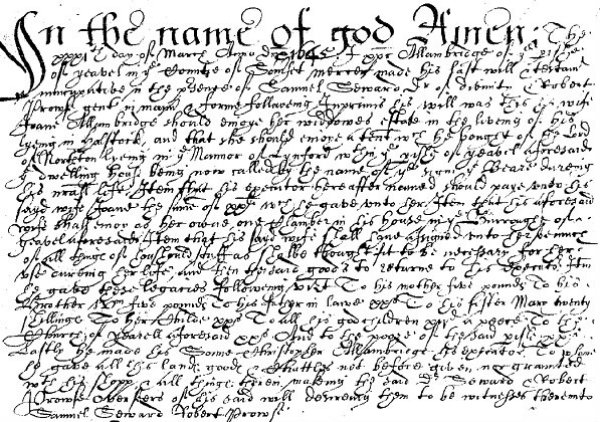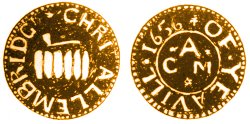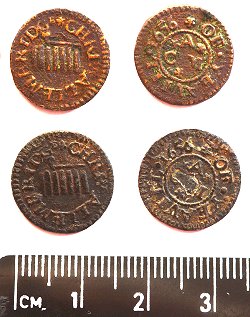yeovil people
Christopher Allembridge
Mercer and Tobacconist
There were at
least three,
possibly four,
successive
generations of
Yeovilians
called
Christopher
Allembridge. The
first
Christopher
Allambridge we
know of was a
mercer and
tobacconist, he
was also a
Warden of
Woborn's
Almshouse in
1631 since a
lease of that
year for a
Yeovil inn
called the
Black Cock
records "Lease
for 3
lives at
an
annual
rent of
13s 4d.
Samuel
Hardinge,
custos,
Robert
Prowse,
gent.,
Christopher
Allambridge,
wardens
to John
Sharpe
of
Yeovil,
shoemaker
-
Burgage
in South
Street,
between
land of
Thomas
Grobham
(occupant
John
Petney)
on east
and of
late Sir
John
Sydenham,
knt, and
of
Portreeve
on
west(formerly
occupied
by
Lawrence
Brooke)
- 21
June
1631 -
Witnesses,
John
Jacobb,
John
Torr,
John
Withell.
Endorsed:
Lease
surrendered
by John
Sharpe 8
Sept '36
and
granted
to John
Hacker
the
Younger
for 99
years at
annual
rent of
13s.4d.
-
Signed:
John
Torr,
Christopher
Allambridge,
Thomas
Lane,
Thomas
Marshe.
(Woborn
Muniments
No. 22)
Christopher Allambridge was mentioned by name in the Letters Patent of Charles I requesting a charitable collection from the nation in response to the Great Fire of Yeovil of 1640.
Christopher Allembridge the elder was most likely born in the latter part of the sixteenth century and from his will dated 1645, the year he died, both his parents were alive at this time as was an un-named brother and a sister, Mary, who was married and had a child. His wife was named Joane and they had one surviving son also called Christopher.
In his will dated 1645 Christopher Allembridge the elder described himself as a mercer although he was mentioned in a document dated 1634 as a 'Tobacconist of Evill'. It appears that he held land in Halstock as well as in the manor of Hendford (possibly the "five acres of land lying in the Comon Fields of Yeovill" referred to below). His dwelling-house was "called by the name of ye sign ye Beare", so it would seem that Christopher was also one of Yeovil's early landlords, or at least owner, of an early alehouse. It was described as being "in ye Burrough of yeavel" although whether this meant the Borough (being part of High Street) or simply the town of Yeovil is not clear. His will also refers to "his shopp" but whether this was integral with the Bear or separate premises is also not clear.
Christopher the elder died in 1645 and was succeeded by his son, Christopher the younger, who ran the 'shopp' and was described as a grocer in a deed of 1659. From the token dated 1656 below we can also see that he was a tobacconist like his father.
|
|
At top, for clarity, is an illustration of a Christopher Allembridge the younger farthing token and below it two examples from my collection. On the obverse, within an outer twisted wire circle, it is inscribed "CHRI ALLEMBRIDGE" around the image of a pipe and roll of tobacco. On the reverse is "OF YEAVELL" and the date 1656 around a plain wire inner circle containing "A.C.M." - again these three initials represent the forenames of the issuer and his wife plus their surname. Christopher Allambridge was recorded as a "Tobacconist of Evil" in 1634. However, since the wife of Christopher Allembridge the elder was named Joane and he died in 1645, it is clear that this token was issued by the son, Christopher Allembridge the younger, whose wife's name began with an 'M'.
|
Christopher Allembridge the younger also inherited the Bear Inn and was recorded in the following deed dated 24 February 1659 which also described him as a grocer - "Feoffmt between James Earl of Northampton, Thomas Newton Esq.,& Tho. Newton Gent. of the one part & Christopher Allambrige Grocer & Maximilian Bard & Thomas Bard Grocers of the other. The sd. Newtons by the appointmt. of the Earl & Nomination of Allembridge Did Grant to Maximilian and Thomas Bard a messuage called the Bear Inn with the appurts. situate in Yeovill in the County of Somerset and also five acres of land lying in the Comon Fields of Yeovill. To hold to Maximilian and Thomas Bard & their Heirs in Trust for Allambridge in fee. In this Grant is excepted a lease made by Earl Spencer of the Manr. of Yeovill to Sr. Edmd. Pye for 99 years which was then vested in John Howel & Geo Goodman Esqrs. who were to grant their Term in sd. Messuage &c. to Allambridge, and there is also an Exception of such Right of Interest which Allambridge had in sd. Messuage &c. by Copy of Court Roll."
It would appear that, like his father before him, Christopher Jnr was also a Warden of Woborn's Almshouse and a deed dated 1649 concerning the Dye House behind the Pall Tavern (both Almshouse properties) recorded "The Dye House changed tenants once more in 1649 "Lease for 2 lives at annual rent of 6s. - John Cary, custos, Richard Lockett, gent., Christopher Allambridge, wardens, to Thomas Churchouse weaver of Yeovil, house called the Dye House between Almshouse on east and tenement (the Pall building) belonging to the Almshouse held by William Swetman senior on west, lives of William Swetman and Elinor his wife. fine 25s. Witnesses - Morgan Hayne, John Withell, John Cary. 8 May 1649." (Woborn Almshouse Muniments No. 34).
In a document dated 23 December 1657 in the Helyar documents and muniments from Coker Court, now in the Somerset Heritage Centre, Taunton, the following is recorded "At a peppercorn rent, from Christopher Allambridge, of Yeovil, grocer, to Bridget Harbyn of Trent, Co. Som. spinster, of two closes called Cox' closes in Pitney, near Yeovil." The two fields were, of course, in Kingston Pitney, Yeovil, not Pitney near Langport.
In the Poor Rate of 1664, Christopher Allambridge is recorded twice; paying 4s 4d (Borough) and 2s 0d (Hendford). I am assuming that the Christopher of the Borough was 'the Younger' and the Christopher of Hendford, in a lesser property, was his son 'the Youngest'.
In 1667 a further lease concerning the Dye House recorded Christopher Allambridge as a gentleman, inferring perhaps that he had risen in Yeovil society - "Lease for 3 lives at annual rent of 6s.8d. - Gyles Hayne, custos, George Prowse, gent., Christopher Allambridge, gent., wardens to Thomas Churchouse, weaver of Yeovil, house called the Dye house between the almshouse on the east and tenement (the Pall building) of the same almshouse held by William Swetnam senior on the west - Lives of Thomas Churchouse, Elizabeth his wife, and Elianor their daughter. fine £4.10s. (mark of) Thomas Churchouse - Witnesses: John Cary, Matthew Wills senior, Matthew Wills junior. Endorsed; quiet and peaceable occupation taken - 16 May 1667" (Woborn Almshouse Muniments No. 63).
By 1694 Christopher Allembridge the younger was dead and the Bear Inn passed to his son, also Christopher Allembridge, noted in a deed dated 22 April 1694 - "Chris: Allambridge Son & Heire of sd. Chris: Allambridge deced". This Christopher Allambridge had a son, John, baptised on 30 January 1700 at St John's church, a daughter Anne baptised on 15 December 1703, a daughter Sarah baptised on 18 February 1705, a daughter Joanah baptised on 19 June 1707, a son Christopher baptised on 1 December 1709, a second daughter named Sarah baptised on 11 February 1712, a daughter Elizabeth baptised on 3 May 1716, a second son called Christopher baptised on 14 February 1718, a daughter Mary baptised on 16 November 1721 and a son George baptised on 24 February 1723.
In 1725 a Court of Chancery case referred to Christopher Allambridge as a 'goldsmith of Yeovil'. Whether this refers to Christopher III or Christopher IV is not known.
The Will of Christopher Allembridge the elder

In the
name of god Amen
The 30th day of
March Anno Dom
1645 of xxr
(Christopher)
Allambridge of
ye p(ar)ish of
yeavel in ye
Countie of
Somset mercer
made his last
will & testamt
(word illegible)
in the presence
of Samuel Seward
D(octo)r of
Divinity &
Robert Prowse
gent in mann(er)
& forme
following
Imprimis his
will was that
his wife Joane
Allambridge
should enioye
(enjoy) her
widdowes estate
in the (word
illegible) of
his lyeing in
Halstock and
that she should
enioye (enjoy)
(words
illegible) of
the Land of
Norteton lyeing
in ye Mannor of
Lynford
(Hendford?)
(unknown
abbreviation) ye
p(ar)ish of
yeavel aforesaid
ye dwelling
house (word
illegible)
called by the
name of ye sign
ye Beare dureing
his (word
illegible) life
Item that his
executor here
after named
should paye unto
his sayd wife
Joane the sum of
xx (20) w(hi)ch
he gave unto her
Item that his
aforesaid wife
shall enioy
(enjoy) as her
owne one (?)
Chamber in his
house in ye
Burrough of
yeavel aforesaid
Item that his
sayd wife shall
have assigned
unto her (word
illegible) of
all (?) things
of (word
illegible) stuff
as shall be
thought fit to
be necessary for
her (word
illegible)
during her life
(word illegible)
then the said
goods to returne
to his Executor
It(e)m he gave
these Legacies
following
(unknown
abbreviation) to
his mother five
pounds To his
Brother (unknown
abbreviation)
five pounds To
his father in
land (?) xx (20
acres?) To his
sister Mary
twenty shillinge
To her Childe
xxs (20
shillings?) To
all his
godchildren
(unknown
abbreviation)
poore To the
Church of
Yeavell
aforesaid xxs
(20 shillings?)
And to the poore
of the said p(ar)ish
xxs (20
shillings?)
Lastly he made
his Sonne
Christopher
Allambridge his
executor To ye
Sonne (?) he
gave all the
lande goods &
chattles not
before (given?)
nor granted (noth?)
his shopp & all
thinges therein
making the said
D(octo)r Seward
& Robert Prowse
(words
illegible) of
his said will
desiring them to
be witnesses
Hereunto Samuel
Seward Robert
Prowse
Christopher Allembridge the elder's will was proved in London on 26 February 1646, although that part of the will is written in Latin.
Transcribed by Bob Osborn

